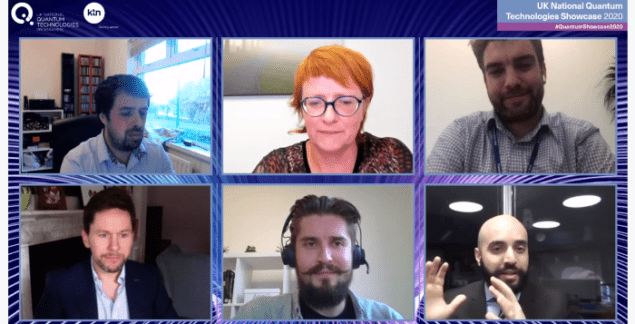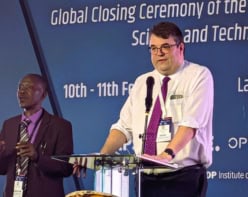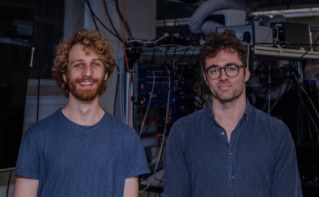
What happens when the irresistible force of quantum entrepreneurship meets the immovable object of a global pandemic?
For the past few years, the UK’s annual Quantum Technology Showcase has taken place at the QE2 conference centre in London, a stone’s throw from the Houses of Parliament, with attendees packing the exhibition hall to hear about the latest academic and industrial research into this growing field. This year, of course, it didn’t look like that. Instead, the presenters appeared by video link from home offices and deserted labs, sharing their experiences with unseen audience members scattered across the UK and beyond.
Under the circumstances, then, it was strange – and strangely comforting – to hear the leaders of four brand-new quantum-tech firms discussing much the same problems as entrepreneurs always do. For Richard Murray, the chief executive of London-based ORCA Computing, the biggest challenge he faces is finding and hiring people with the right skills and experience. “There are lots of people with PhDs,” he said. “Where the UK does need to boost its competitiveness is the more industrial-experience skill sets.” Optical engineers, he added, are “hard to come by” even for a firm like his that has won awards (and nearly £3m in venture capital funding) for its optical-fibre-based quantum computing technology.
Another panellist, Max Sich, said that he is most concerned about the relative immaturity of quantum technologies – including the semiconductor platform that his Sheffield-based firm, AegiQ, is developing for quantum cryptography systems. “Quantum is still a very risky technology compared to other things people invest in,” he observed. “We sit here in our quantum bubble and we all believe in it. Not everybody does.” The standard logic of a start-up is to grow fast and get big, but Sich noted that quantum technologies are mostly too undeveloped to achieve that yet. “Seed” funding and grants from the UK government via the funding agency Innovate UK, he added, help to bridge the gap.
The third panellist, Anthony Laing, was something of an outlier in the group. Although he co-founded his photonic quantum computing firm, Duality Quantum Photonics, in February 2020, he remains part of the academic world, as a physicist at the University of Bristol. Yet even for academics like him, he said, “entrepreneurialism in quantum technologies is in the air”. His current goal is to design and fabricate photonic quantum processors that can simulate phenomena relevant to drug design in the pharmaceutical industry. When asked what he hoped to bring to next year’s showcase, he suggested that Duality Quantum Photonics might have a prototype in 2021 – one year into the company’s five-year plan.
The session’s final speaker, Ramy Aboushelbaya, is the co-founder and chief exec of a University of Oxford spin-out called Quantum Dice. As the company’s name implies, the main product Aboushelbaya and his colleagues are building is a quantum random number generator (RNG) for encryption systems. Like AegiQ, Quantum Dice received support from Innovate UK, and Aboushelbaya described such grants as “a validation” that helped them attract additional private funding. He and his team of five are now hoping to hire more electronic and photonic engineers, with the aim of bringing their first commercial RNG to next year’s showcase.
Quantum technology: why the future is already on its way
The coronavirus-shaped elephant in the room finally made an appearance at the end of the session, in remarks by Roger McKinlay, the challenge director for quantum technologies at UK Research and Innovation. “It kind of hurts to have seen so many friends and not be able to loiter and chat to find out how life is going, not just how business is going,” McKinlay lamented. Nevertheless, he added, there has been “much progress in 12 months” towards developing “a vibrant quantum start-up culture” in the UK – a point corroborated by session moderator Anke Lohmann, who noted that her consultancy, Anchored In, has identified six quantum start-ups that incorporated in the UK in 2020. “We live in uncertain times, but in the midst of a crisis, we’ve seen so many good and healthy signs,” McKinlay concluded.




